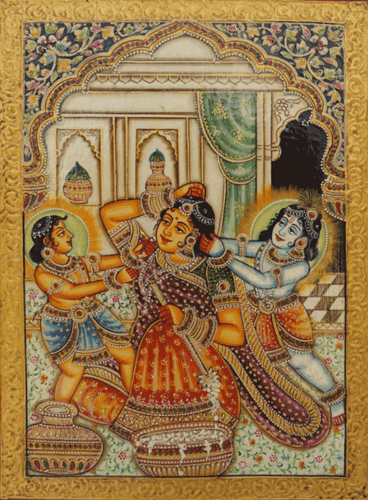

About Usta miniature
Usta miniature art is a distinctive and ancient form of Indian painting that flourished in the royal courts of Bikaner, Rajasthan. Renowned for its exquisite detailing and use of gold leaf, this art form captures the opulence and sophistication of Rajasthani culture. Usta paintings are celebrated for their intricate patterns, vibrant colors, and the masterful skill of the artists who create them. Additionally, floral motifs, animal figures, and nature scenes are prevalent, reflecting the artist's skill in rendering both human and natural elements with precision and elegance.
History
The origins of Usta miniature art can be traced back to the Mughal era, with its roots deeply embedded in Persian art traditions. The art form was introduced to Bikaner by Persian artisans who were invited by the Mughal emperors. Under the patronage of the Bikaner royal family, Usta art evolved and flourished, becoming an integral part of the region's cultural heritage. The craft has been passed down through generations of the Usta community, preserving its traditional techniques while adapting to changing artistic trends.
Materials and Methods
Usta miniature art utilizes a variety of materials to achieve its distinctive look. Natural pigments, derived from minerals and plants, are used to create the vibrant colors seen in the paintings. Gold leaf is applied to highlight specific areas and add a touch of opulence. Traditional brushes, made from squirrel hair, are used for fine detailing. The painting surface is often camel leather or wood, known for its durability and smooth texture. The creation process involves preparing the surface, sketching the design, applying colors, and finally embellishing with gold leaf.
Significance
Usta miniature art holds significant cultural and historical value. It represents a rich tradition of craftsmanship and artistry that reflects the grandeur of Rajasthan's royal heritage. The art form not only showcases the skill and creativity of the Usta artists but also serves as a visual record of historical events, courtly life, and religious stories. In contemporary times, Usta miniature art continues to be a symbol of luxury and refinement, contributing to the preservation and appreciation of India's artistic legacy.
FAQS
Where can Usta miniature art be seen today?
Usta miniature art can be seen in historical palaces, havelis, and temples in Rajasthan, particularly in Bikaner. Contemporary Usta artists also create paintings, decorative items, and furniture that are sold in art galleries and exhibitions.
Can Usta miniature art be customized?
Yes, Usta miniature art can be customized to include specific themes, colors, or designs based on the client's preference. MeMeraki takes commissions for personalized artwork
.
What role does Usta art play in contemporary interior design?
Usta art is increasingly used in contemporary interior design for its rich visual appeal and traditional elegance. It is often featured in luxury decor, including wall panels, decorative boxes, mirrors, and custom furniture, adding a regal touch to modern spaces.
Highlights of Usta miniature Artform
| Artform | Usta miniature |
|---|---|
| Origin | Rajasthan |
| Materials Used | Wood |
| Colours Used | Red, Blue, Orange, Black, Multicoloured, Gold |
| Popular Themes | Lotus, Birds, Hindu, Ganesha, Krishna, Shiva, Shreenathji, Folk Art, Radha Krishna, Flower, Couple, Parvati, Marriage, Parrot, Religious, Leaves, Balaji, Gopis, God |
| Price Range | |
| Artists | Pankaj Kumar |
| Making Process | Handmade |









